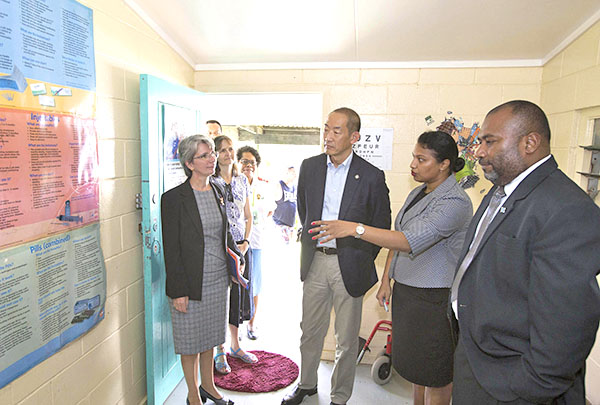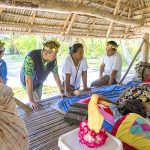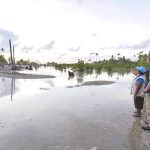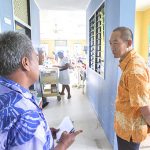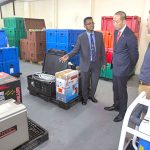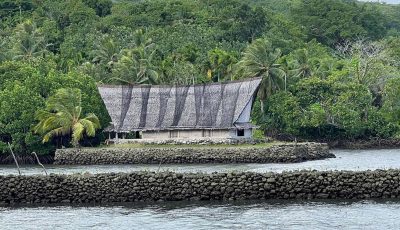CLIMATE CHANGE, NCDS, EMERGENCIES
New WHO regional chief highlights his priorities
SUVA, Fiji—The new World Health Organization regional director for the Western Pacific, Dr. Takeshi Kasai, met this week with leaders, partners, and communities in the Pacific to discuss critical health challenges and solutions.
“Every Pacific island is different and each has specific health challenges that require tailored approaches,” said Kasai. “At the same time, what I’ve seen and heard throughout the past year—including during visits to hospitals, clinics, schools and communities in Fiji and Kiribati this week—is that to better support the people of the Pacific, we must do more to address the impact on health of climate change, tackle the high burden of noncommunicable diseases like diabetes and high blood pressure, and improve preparedness for disasters and outbreaks.”
“Member states across the Pacific want WHO to focus more on these critical areas with new and innovative ways to address the needs of their people,” he said. “I’m committed to working with governments and partners to do exactly that.”
Dr. Corinne Capuano, director of Pacific Technical Support and WHO representative to the South Pacific, stressed the significance of Kasai’s extended visit: “Having Dr. Kasai here in Fiji and Kiribati so soon after taking up leadership of WHO in the region highlights just how important the Pacific is and how pressing challenges like climate change are.”
“Under his leadership, our dedicated teams in Suva, Honiara, Port Vila, Apia, Tarawa, Pohnpei and Nuku’alofa will continue working closely with governments and partners to address each islands’ unique challenges,” she said.
Climate change and health
Throughout the weeklong visit, Kasai witnessed the ravages of climate change, including entire villages destroyed by rising seas in Kiribati. “While climate change creates health risks for everyone on the planet, for many in the Pacific it threatens their very existence,” he said.
“Now more than ever we need to help decision-makers understand the need for immediate action to create strong, climate-resilient health systems,” he said.
Extreme weather events and environmental changes affect air quality, safe drinking-water, food security and housing. They increase rates of heat stress, malnutrition, diarrhea and vector-borne diseases, and strain health systems.
- World Health Organization regional director for the Western Pacific, Dr. Takeshi Kasai, visits the Taburao Health Clinic on Kiribati’s Abaiang Island. (Contributed Photo)
- Dr. Takeshi Kasai, World Health Organization regional director for the Western Pacific, visit coconut groves killed by salt water intrusion on Kiribati’s Abaiang Island, near relocated Tabunginkao Village. (Contributed Photo)
- Dr. Takeshi Kasai, World Health Organization regional director for the Western Pacific, visit the Tungaru Central Hospital on Tarawa, Kiribati. (Contributed Photo)
- Dr. Takeshi Kasai, World Health Organization regional director for the Western Pacific, visit Fiji’s Emergency Medical Assistance Team warehouse, with equipment on standby for deployment. (Contributed Photo)
Noncommunicable diseases
Noncommunicable diseases, including heart disease, stroke and diabetes, are the leading cause of premature deaths in the Pacific. Stepping up efforts to address these challenges—and the burden they place on families and societies—is a moral and economic imperative, he said.
“Risk factors such as tobacco, harmful use of alcohol, unhealthy diets and physical inactivity are putting a great deal of pressure on health systems across the Pacific,” said Kasai. “We must do better.”
Combating NCDs requires strong primary health care systems that “look at the whole person, the foods they eat and the lifestyle they lead.”
Emergencies and outbreaks
Disease outbreaks, natural disasters and climate change increasingly affect the Pacific. In 2018 alone, there were more than 20 infectious disease events and 12 public health disasters in the Pacific. In addition to the loss of lives, these events often cause widespread economic and social disruption.
“These hazards threaten national and regional health security. They impact directly the health and safety of communities, and seriously disrupt health services, as responding can be both logistically and financially draining,” said Kasai.
The WHO Health Emergencies Programme team in Fiji works closely with governments and regional partners to develop practical solutions and strengthen capacities to detect, assess and respond to emergencies.
“When disaster strikes, we’re ready to deploy our team of trained emergency response professionals, as well as medical supplies and other resources, to help governments and communities in need,” he said.
Meeting and greeting
In Fiji, Kasai met with the Attorney-General Aiyaz Sayed-Khaiyum, Minister of Health and Medical Services Ifereimi Waqainabete, and other senior leaders. He spoke to students and faculty at Fiji National University, and visited health care facilities as well as a health promoting school.
In Kiribati, Kasai met with Minister of Health and Medical Services Tauanei Marea and other national and community leaders. He visited primary health care facilities and villages in South Tarawa and on Abaiang Island to see first-hand the effects of climate change.
“It has been an honor to meet and speak with so many people across the Pacific,” Kasai said. “From top political leaders to health professionals, students and citizens, we all have one thing in common: we know that we must work together today to address the health challenges of tomorrow.” (PR)



